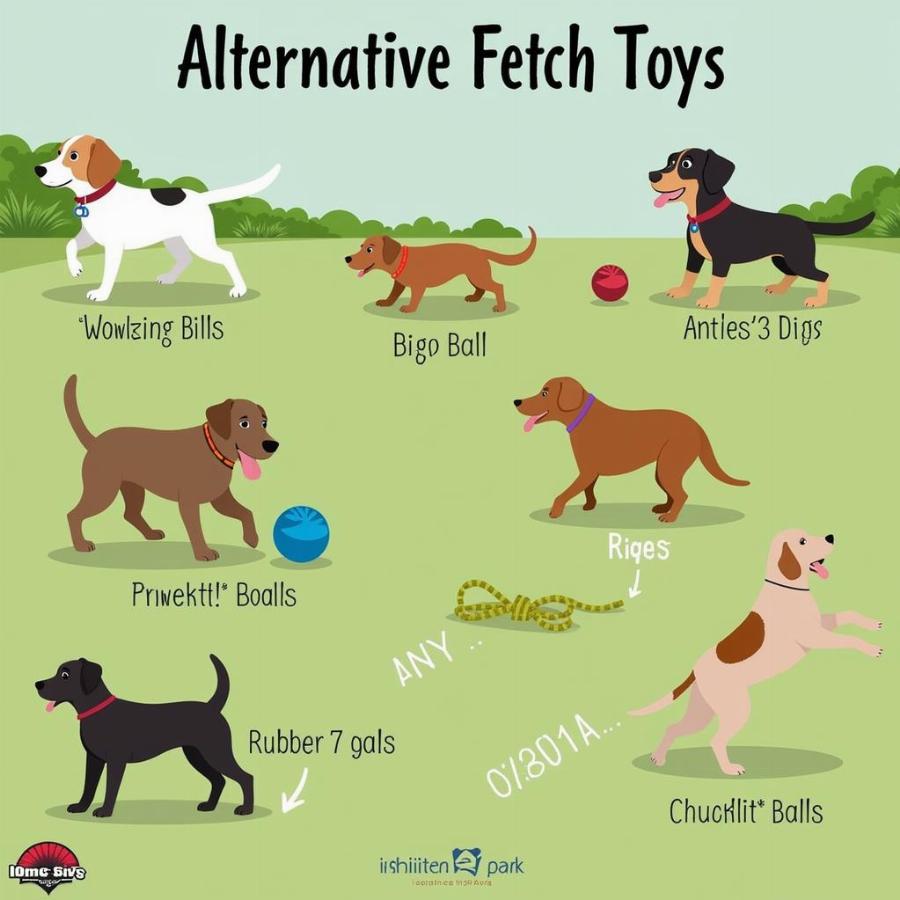Dog tennis balls are a classic toy, beloved by pups and their owners alike. They’re readily available, relatively inexpensive, and provide hours of fetching fun. But are all tennis balls created equal? And are they always the safest option for your furry friend? This comprehensive guide delves into everything you need to know about dog tennis balls, from choosing the right size and type to ensuring your dog plays safely.
What makes tennis balls so appealing to dogs? Their bouncy nature, bright color, and fuzzy texture trigger a dog’s natural prey drive. The squeaking sound some tennis balls emit adds another layer of engagement. However, it’s crucial to understand the potential risks and choose the right ball for your dog’s size, breed, and chewing habits. Let’s explore the world of dog tennis balls and how to make playtime safe and enjoyable.
Choosing the Right Tennis Ball for Your Dog
Not all tennis balls are suitable for dogs. Standard tennis balls designed for humans can pose risks if chewed excessively. The fuzzy exterior can wear down, and dogs might ingest the felt, leading to digestive issues. The rubber itself can also be a choking hazard, especially for smaller breeds. So, what should you look for?
Size Matters
Choosing the correct size is paramount. A small tennis ball can be a choking hazard for larger dogs, while a large ball can be too cumbersome for smaller breeds. Consider your dog’s size and jaw strength when selecting a ball.
- Small Dogs: Opt for mini tennis balls specifically designed for small breeds.
- Medium to Large Dogs: Standard or slightly larger tennis balls are usually appropriate.
- Giant Breeds: Extra-large tennis balls or other durable fetch toys are recommended.
Durability is Key
Look for tennis balls specifically designed for dogs. These are often made from more durable materials and are less likely to break apart when chewed. They also come in various sizes to suit different breeds.
Tennis Ball Safety Tips
While tennis balls can provide hours of fun, it’s important to prioritize safety. Here are some essential tips to keep in mind:
- Supervise Playtime: Always supervise your dog when they are playing with a tennis ball, especially if they are prone to chewing.
- Inspect Regularly: Check the ball for wear and tear and replace it if it becomes damaged. A worn-down ball can become a choking hazard.
- Limit Chewing: Discourage excessive chewing on the ball. Offer alternative chew toys for those times when your dog wants to gnaw.
- Know Your Dog: Understand your dog’s chewing habits. If they are aggressive chewers, consider more durable toys.
Alternatives to Tennis Balls
If you’re concerned about the potential risks of tennis balls, there are plenty of safe and engaging alternatives.
- Rubber Balls: Durable rubber balls come in various sizes and textures.
- Rope Toys: Rope toys are great for tug-of-war and can satisfy a dog’s chewing instinct.
- Chuckit! Balls: These specially designed balls are durable and come in different sizes and materials.
 Dogs Playing with Alternative Fetch Toys
Dogs Playing with Alternative Fetch Toys
Why Do Dogs Love Tennis Balls? The Science Behind the Obsession
The love for tennis balls isn’t just a coincidence. Several factors contribute to this canine fascination.
- Prey Drive: The ball’s movement triggers a dog’s natural instinct to chase and retrieve.
- Texture and Sound: The fuzzy texture and the squeaking sound (in some balls) stimulate a dog’s senses.
- Interactive Play: Playing fetch with a tennis ball provides mental and physical stimulation.
Are Tennis Balls Bad for Dogs’ Teeth?
While moderate play with tennis balls is unlikely to cause significant dental problems, excessive chewing can lead to wear and tear on the teeth. The abrasive nature of the felt can contribute to this. Regular dental checkups and providing appropriate chew toys can help mitigate this risk.
Conclusion
Dog tennis balls are a fun and affordable way to engage your dog in playtime. However, it’s essential to choose the right type of ball, supervise play, and be mindful of potential risks. By following the guidelines in this guide, you can ensure that your furry friend enjoys their tennis ball safely and responsibly. Remember, a happy dog is a healthy dog!
FAQ
- Can my dog swallow a tennis ball? While rare, it is possible for a dog to swallow a small tennis ball. Always choose an appropriate size and supervise playtime.
- What should I do if my dog swallows a piece of a tennis ball? Contact your veterinarian immediately.
- Are there non-toxic tennis balls for dogs? Yes, look for tennis balls specifically marketed for dogs, as these are often made with safer materials.
- How often should I replace my dog’s tennis ball? Replace the ball as soon as it shows signs of wear and tear.
- Can I use regular tennis balls for my dog? While you can, it’s generally recommended to use dog-specific tennis balls for safety reasons.
- What are some good alternatives to tennis balls for dogs who love to fetch? Rubber balls, rope toys, and Chuckit! balls are all great alternatives.
- How can I prevent my dog from destroying tennis balls so quickly? Try to limit chewing and provide alternative chew toys.
Related Articles
For more information about dog toys and playtime, check out these related articles on Beaut Dogs:
- tennis balls for dogs
- large tennis ball for dogs
- dogs and tennis balls
- why do dogs love tennis balls
Beaut Dogs is your trusted source for all things dog-related. We provide expert advice and information to help you care for your canine companion. For any further assistance, contact us at Email: [email protected] and we’ll be happy to help. We at Beaut Dogs are committed to providing you with accurate and helpful information.